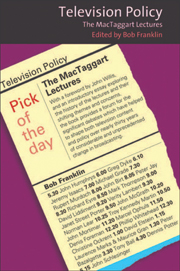Book contents
- Frontmatter
- Contents
- Acknowledgements
- Foreword
- Introduction
- The James MacTaggart Lectures
- TV Drama: The Case against Naturalism
- Naturalism and Television
- Taboos in Television
- Signposting Television in the 1980s: The Fourth Television Channel
- Television Drama, Censorship and the Truth
- The Day after Tomorrow: The Future of Electronic Publishing
- The Primacy of Programmes in the Future of Broadcasting
- Reflections on Working in Film and Television
- ‘Opening up the Fourth Front’: Micro Drama and the Rejection of Naturalism
- Power and Pluralism in Broadcasting
- Ethics, Broadcasting and Change: The French Experience
- Freedom in Broadcasting
- Deregulation and Quality Television
- The Future of Television: Market Forces and Social Values
- The Future of the BBC
- Occupying Powers
- A Culture of Dependency: Power, Politics and Broadcasters
- Talent versus Television
- A Glorious Future: Quality Broadcasting in the Digital Age
- Rewarding Creative Talent: The Struggle of the Independents
- Television versus the People
- Public-Interest Broadcasting: A New Approach
- A Time for Change
- The Soul of British Television
- Television's Creative Deficit
- Freedom of Choice: Public-Service Broadcasting and the BBC
- First Do No Harm
- Appendix A Edinburgh International Television Festival, 29 August–2 September 1977: Programme
- Appendix B Précis of Ted Turner, James MacTaggart Lecture 1982; Dr Jonathan Miller, James MacTaggart Lecture 1983
- Index
First Do No Harm
from The James MacTaggart Lectures
Published online by Cambridge University Press: 05 August 2013
- Frontmatter
- Contents
- Acknowledgements
- Foreword
- Introduction
- The James MacTaggart Lectures
- TV Drama: The Case against Naturalism
- Naturalism and Television
- Taboos in Television
- Signposting Television in the 1980s: The Fourth Television Channel
- Television Drama, Censorship and the Truth
- The Day after Tomorrow: The Future of Electronic Publishing
- The Primacy of Programmes in the Future of Broadcasting
- Reflections on Working in Film and Television
- ‘Opening up the Fourth Front’: Micro Drama and the Rejection of Naturalism
- Power and Pluralism in Broadcasting
- Ethics, Broadcasting and Change: The French Experience
- Freedom in Broadcasting
- Deregulation and Quality Television
- The Future of Television: Market Forces and Social Values
- The Future of the BBC
- Occupying Powers
- A Culture of Dependency: Power, Politics and Broadcasters
- Talent versus Television
- A Glorious Future: Quality Broadcasting in the Digital Age
- Rewarding Creative Talent: The Struggle of the Independents
- Television versus the People
- Public-Interest Broadcasting: A New Approach
- A Time for Change
- The Soul of British Television
- Television's Creative Deficit
- Freedom of Choice: Public-Service Broadcasting and the BBC
- First Do No Harm
- Appendix A Edinburgh International Television Festival, 29 August–2 September 1977: Programme
- Appendix B Précis of Ted Turner, James MacTaggart Lecture 1982; Dr Jonathan Miller, James MacTaggart Lecture 1983
- Index
Summary
John Humphrys addresses two connected themes. First, bad television has become ‘damaging. Meretricious. Seedy. Cynical’ and harms society; second, if journalists engage in self-censorship post-Hutton this will harm democracy. The Hippocratic Oath offers a sound principle for broadcasters and journalists – ‘First do no harm’.
Humphrys invited sixteen Channel Controllers to send him ten tapes illustrating the ‘case for television’. Having watched them, he concluded that the ‘best television’ is ‘better than ever’ but the worst has become preoccupied with sex, confrontation, aggression and violent language, ‘even in the soaps’. Reality TV is the real culprit. It turns ‘human beings into freaks for us to gawp at’ and, significantly, ‘erodes the distinction between the public and the private’. Three defences are offered. The ‘Blue Planet’ defence emphasises the availability of quality programming, market apologists claim they are simply meeting public demand for certain kinds of programmes, while the ‘no brow’ argument suggests that programming should no longer be classified into high or low brow, but simply as ‘no brow’. But Humphrys argues that good television ‘cannot pay the dues of the bad when the bad is indefensible’. Ofcom should intervene to prevent the supply of these ‘debit goods’ on terrestrial services in much the same way that it attempts to secure the provision of ‘merit goods’.
- Type
- Chapter
- Information
- Television PolicyThe MacTaggart Lectures, pp. 265 - 274Publisher: Edinburgh University PressPrint publication year: 2005



